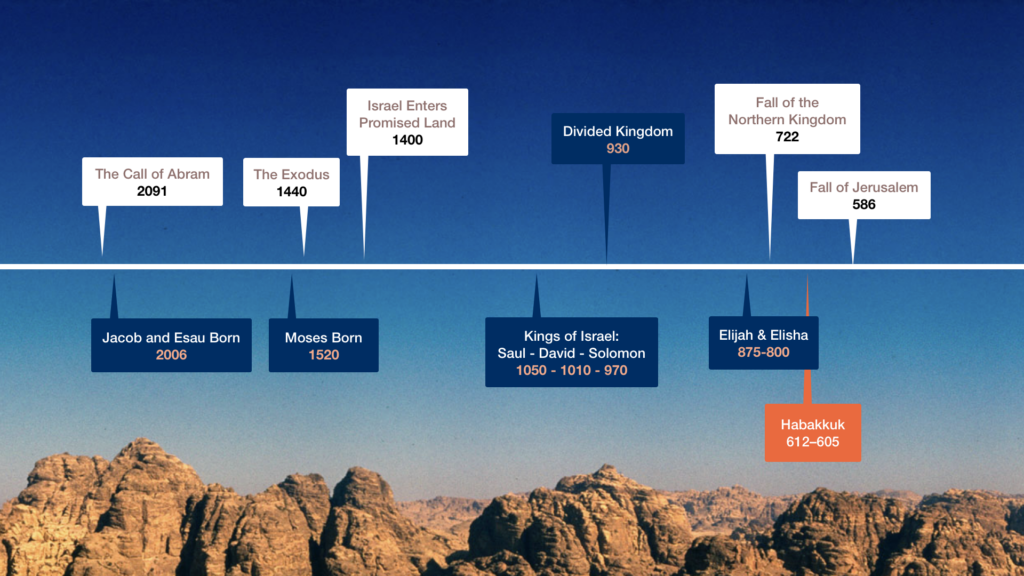The Minor Prophets: The God of Our Salvation
Associate Pastor Tom Yarbrough
Habakkuk 3

“Poets tell us what our eyes, blurred with too much gawking, and our ears, dulled with too much chatter, miss around and within us. Poets use words to drag us into the depth of reality itself.”
Eugene Peterson
“What comes into our minds when we think about God is the most important thing about us.”
A. W. Tozer, The Knowledge of the Holy
Additional Reading for Habakkuk 3:
- Exodus 7
- Exodus 15
- Exodus 19
- Deuteronomy 33
- Joshua 2, 10
- Judges 4-5
- Psalm 18, 46
For Habakkuk, worshipfully recounting the story of God results in:
1. A Resolve to Wait
“It’s vital to understand that waiting isn’t an interruption of God’s plan. It is his plan. And you can know this as well: the Lord who’s called you to wait is with you in your wait.”
Paul Tripp
2. A Reason to Rejoice
“’Rejoicing in suffering’ does not mean Christians should act happy about tragedy and pain when they feel like crying. Rather, the Bible aims the spotlight on the end result, the productive use God can make of suffering in our lives. To achieve that result, however, he first needs our commitment of trust, and the process of giving him that commitment can be described as rejoicing.”
Philip Yancey
3. A Reinforced Faith
“A man may be haunted with doubts and only grow thereby in faith. Doubts are the messengers of the Living One to the honest. They are the first knock at our door of things that are not yet, but have to be, understood.”
George Macdonald
“Faith comes from hearing, and hearing through the word of Christ.”
Romans 10:17
“This little book opens in gloom and closes in glory. It begins with a question mark and closes with an exclamation point. Habakkuk is a big WHY? Why God permits evil is a question that every thoughtful mind has faced. I think that this book is the answer to that question. Will God straighten out the injustice of the world? This book answers that question. Is God doing anything about the wrongs of the world? This book says that He is.”
J. Vernon McGee
“We don’t live on explanations, we live on promises, and the promises of God are based on the character of God.”
Warren Wiersbe, Be Amazed
“Rejoice in the Lord always; again I will say, rejoice.”
Philippians 4:4
Discussion Questions
- A.W. Tozer said, “What comes to our mind when we think about God is the most important thing about us.” Pastor Tom asked us, “What is the report you have heard of the Lord?” When you think of God, what descriptions immediately come to mind?
- Where did these descriptions come from? (e.g., Sunday school, a parent, culture, experience, Nature, the Bible) How do those thoughts about God’s character affect how you view your past, current and future situations?
- The Scripture we studied is called “the Psalm of Habakkuk” because it is written as a song intended to be performed with musical instruments. Eugene Peterson said, “Poets use words to drag us into the depth of reality itself.” What in Habakkuk’s poem stuck out to you, and did it give you a larger view of God’s character?
- “’Rejoicing in suffering’ does not mean Christians should act happy about tragedy and pain when they feel like crying. Rather, the Bible aims the spotlight on the end result, the productive use God can make of suffering in our lives. To achieve that result, however, he first needs our commitment of trust, and the process of giving him that commitment can be described as rejoicing.” Do you agree with Yancy that trust is a form of rejoicing?
- Ultimately, as we sing the song “He is Making All Things Right”, how can our hearts be transformed from a position of worry and doubt to choosing a way that is full of faith, trust, and rejoicing?
- Pastor Tom gave us additional scriptures to read to encourage us and provide historical context and a larger view of our salvation history. Did any of those resonate with you?
